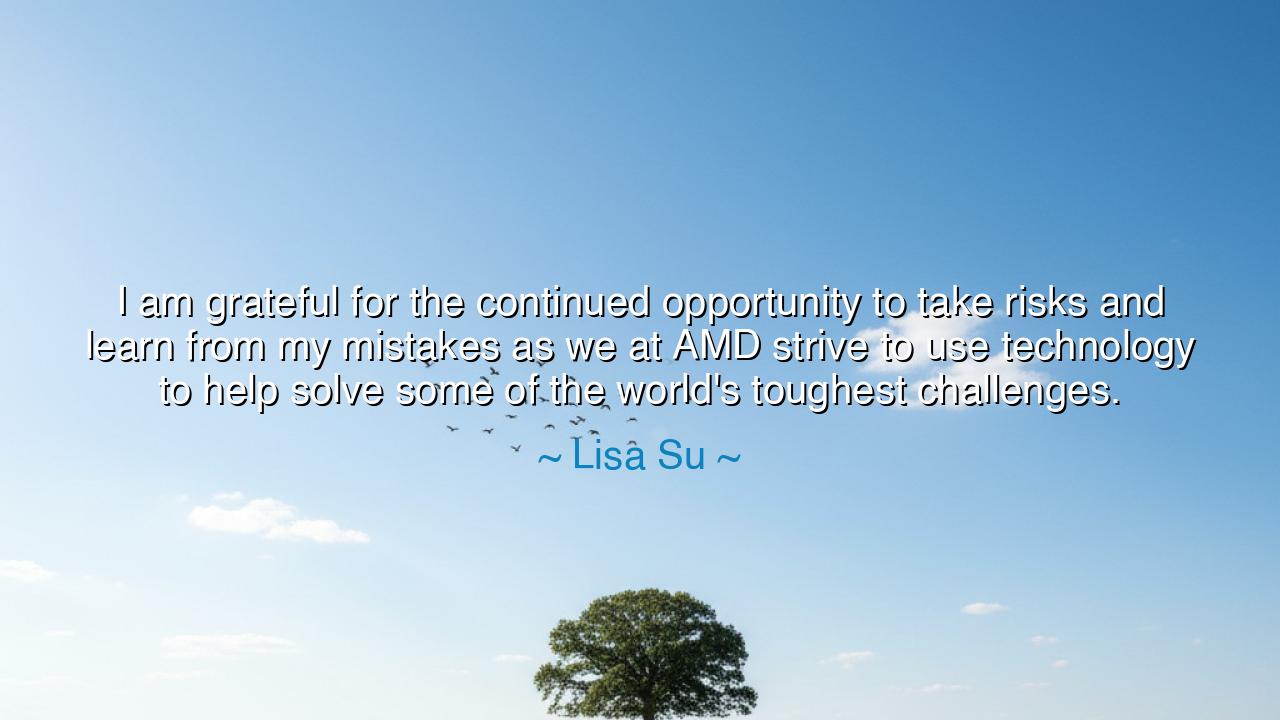
I am grateful for the continued opportunity to take risks and
I am grateful for the continued opportunity to take risks and learn from my mistakes as we at AMD strive to use technology to help solve some of the world's toughest challenges.






Hear, O seekers of wisdom, the voice of Lisa Su, leader and visionary, who spoke thus: “I am grateful for the continued opportunity to take risks and learn from my mistakes as we at AMD strive to use technology to help solve some of the world’s toughest challenges.” In these words lie the essence of the human journey: gratitude in the face of struggle, courage in the midst of uncertainty, and the noble calling to wield technology not for vanity, but for the service of the world. This is not merely a corporate saying, but a teaching for all who dream and labor toward the betterment of mankind.
Consider, O children of tomorrow, the nature of risk. From the dawn of time, every advance has been born of it. When the first sailor set his craft upon the sea, he risked the wrath of the waves. When the healer sought new herbs, he risked both poison and cure. So too in our age do the builders of circuits and machines risk failure, ridicule, and collapse. Yet without risk, no seed would break its shell, and no oak would rise from the soil. Lisa Su reminds us that it is not safety but daring that builds the path to greatness.
Yet risk alone is not enough. For the reckless fall as quickly as they rise. What makes the journey fruitful is the wisdom to learn from mistakes. To stumble is not shameful; to rise again without learning is the true defeat. Even the mightiest inventors, like Thomas Edison, endured countless failures before light itself bowed to his persistence. So too at AMD, where bold ideas may falter before they triumph, each misstep is not an end, but a teacher. In this way, mistakes become the stones on which future triumph is built.
And what is the purpose of such striving? Lisa Su declares it clearly: to use technology in the service of the world’s great challenges. For what use is power if it does not heal? What value has innovation if it does not lift burdens? Across history, the noblest minds have turned their craft toward the good of the people—be it Jonas Salk, who gave the polio vaccine freely to save millions, or Florence Nightingale, who applied science to cleanse hospitals of death. In their spirit, Su speaks not of technology as toy or idol, but as a weapon against hunger, disease, and hardship.
Behold the trials of our age: climate that trembles, nations divided, disease that stalks unseen. These are the dragons of our century, fierce and unyielding. Yet as in the old tales, dragons are not slain by sword alone, but by courage joined with cunning. Technology, rightly guided, becomes the spear to pierce their scales. High-performance computing that predicts the storms, chips that power medical research, systems that connect distant voices—these are the tools by which the great struggles may be met.
But let none forget, O listeners, that gratitude must walk beside ambition. Lisa Su begins not with triumph, but with thankfulness—for the chance itself to risk, to fail, to rise again. Gratitude is the shield that guards the heart against despair, the reminder that every trial is itself a gift. When we give thanks even for our struggles, we transform suffering into strength. Thus, her words teach us not only how to labor, but how to endure.
The lesson is clear: live boldly, but live wisely. Take risks, but let every fall make you stronger. Use your gifts, but bend them toward the good of the many. In your own life, practice this path: welcome challenges rather than fleeing from them. Reflect on your mistakes, and let them become your teachers. And when you wield your own tools—whether of code, craft, or word—ask always: “Does this help? Does this heal? Does this serve?” If you walk this way, you too will join the lineage of those who turned adversity into victory, and risk into renewal.
Therefore, O children of light and circuit, remember Lisa Su’s words. For in them are both humility and strength, both the courage of the warrior and the gratitude of the sage. If you walk with such balance, you shall find that even the world’s toughest challenges can be met—not by perfection, but by persistence, by risk, by learning, and by the noble purpose of serving life itself.






AAdministratorAdministrator
Welcome, honored guests. Please leave a comment, we will respond soon